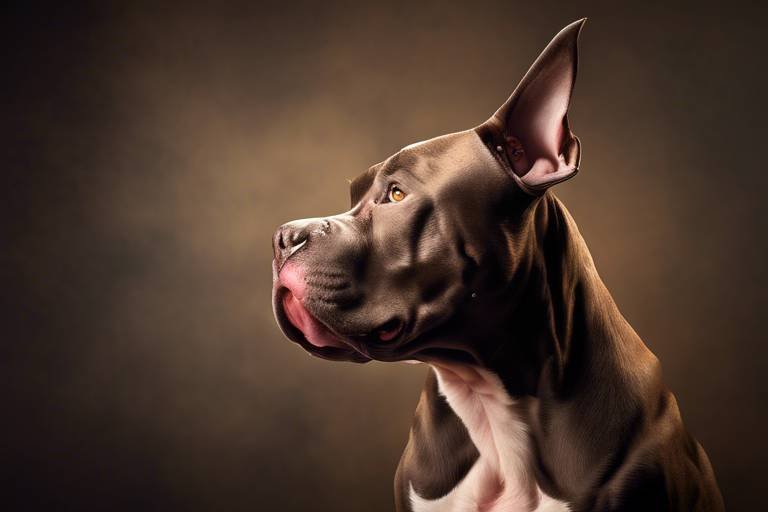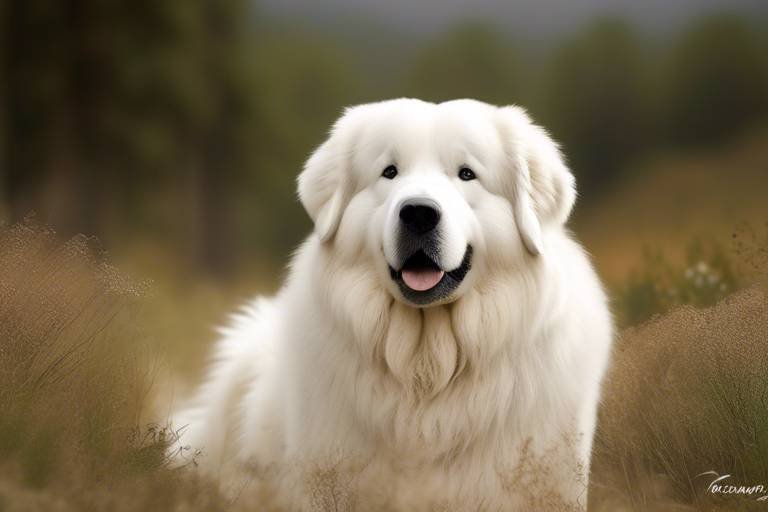The Personality Traits of the Cocker Spaniel
Cocker Spaniels are truly a delightful breed, known for their unique personality traits that make them stand out in the canine world. With their charming looks and vibrant spirit, these dogs have captured the hearts of many families across the globe. Understanding their temperament, behavior, and social interactions is crucial for anyone considering welcoming a Cocker Spaniel into their home. This article dives deep into what makes these furry companions so special, providing insights that will help potential owners and enthusiasts alike appreciate the true essence of a Cocker Spaniel.
One of the most defining characteristics of Cocker Spaniels is their affectionate disposition. These dogs are known for forming strong, loving bonds with their families, often following their humans around the house like little shadows. Their need for love and attention is not just a trait; it's a fundamental part of their being. Imagine coming home after a long day, and your Cocker Spaniel greets you with wagging tails and joyful barks. This warm welcome can instantly lift your spirits! Their affectionate nature makes them excellent companions, thriving on the love they receive from their owners. They are the type of dogs that will snuggle up to you on the couch, always ready to offer comfort and companionship.
Cocker Spaniels are not just lap dogs; they possess an undeniable playful and energetic spirit. This makes them ideal for active families who enjoy engaging in outdoor activities. Whether it's a game of fetch in the park or a spirited run around the backyard, these dogs bring a burst of energy that can lighten up any household. Their enthusiasm for playtime is contagious, encouraging everyone to join in on the fun. Picture this: a sunny afternoon, a ball in hand, and your Cocker Spaniel racing towards you with unrestrained joy. It's moments like these that create lasting memories and strengthen the bond between you and your furry friend.
When it comes to intelligence, Cocker Spaniels are no slouches. They are quick learners who respond well to training, especially when positive reinforcement methods are used. Their eagerness to please their owners makes them relatively easy to train, which is a huge plus for new dog owners. Consistency and patience are key when teaching them commands or tricks, but the payoff is well worth the effort. Imagine the pride you’ll feel when your Cocker Spaniel masters a new trick or learns to behave around guests. Their intelligence also means they thrive on mental stimulation, so incorporating puzzle toys or interactive games into their routine can keep their minds sharp.
Early socialization is crucial for Cocker Spaniels to develop good manners. These dogs generally get along well with other pets and children, making them a great addition to family life. Proper socialization not only helps them become well-rounded dogs but also enhances their interactions with various environments and people. A well-socialized Cocker Spaniel is confident and comfortable in new situations, whether it’s meeting new friends at the dog park or adjusting to the hustle and bustle of family gatherings.
Cocker Spaniels typically exhibit friendly behavior towards other pets. Their sociable nature allows them to coexist harmoniously in multi-pet households. If you already have other animals at home, introducing a Cocker Spaniel can lead to a lively and loving environment. They often engage in playful antics with their furry companions, creating a delightful atmosphere where everyone can thrive together.
When it comes to children, Cocker Spaniels shine as excellent companions. Their gentle temperament makes them suitable family pets, as they often display patience and playfulness with little ones. They are known to be tolerant and loving, making them a perfect match for families with kids. Whether it’s a game of chase or a quiet moment snuggled up on the couch, Cocker Spaniels are always ready to be a child's best friend.
To keep their beautiful coats in top condition, regular grooming is essential for Cocker Spaniels. Understanding their grooming needs helps owners maintain their pets' health and appearance. Cocker Spaniels have long, flowing coats that require regular brushing to prevent matting and tangles. Additionally, routine baths and ear cleaning are vital to keep them looking and feeling their best. While grooming might seem like a chore, it can also be a bonding experience, turning into a time for cuddles and affection.
Cocker Spaniels are known for their vocal nature. They often communicate through barking, which can be managed with proper training and socialization. Understanding their vocalizations is key to building a strong relationship with your Cocker Spaniel. Each bark can convey different emotions or needs, and learning to interpret these sounds can enhance the bond between you and your dog. After all, who wouldn’t want to understand what their furry friend is trying to say?
Each bark can convey different emotions or needs. For instance, a high-pitched bark might indicate excitement or playfulness, while a deep bark could signal alertness or concern. By paying attention to these vocal cues, you can respond appropriately, fostering a deeper connection with your Cocker Spaniel. It’s like having a conversation with your dog, where every bark tells a story.
Cocker Spaniels also communicate through body language. Observing their posture and movements can provide valuable insights into their feelings and intentions. For example, a wagging tail usually signifies happiness, while a lowered head might indicate submission or fear. Being attuned to these subtle cues can help you understand your dog better and respond to their needs more effectively.
- Are Cocker Spaniels good with children? Yes, they are known for their gentle nature and patience, making them great companions for kids.
- How often should I groom my Cocker Spaniel? Regular grooming is essential, ideally once a week, to maintain their coat and prevent matting.
- Do Cocker Spaniels bark a lot? They can be vocal, but with proper training, their barking can be managed.
- How much exercise do Cocker Spaniels need? They require daily exercise, including walks and playtime, to stay healthy and happy.

Affectionate Nature
This article explores the unique personality traits of Cocker Spaniels, including their temperament, behavior, and social interactions, providing insights for potential owners and enthusiasts alike.
Cocker Spaniels are known for their affectionate disposition, often forming strong bonds with their families. These dogs thrive on love and attention, and their warm-hearted nature makes them excellent companions. Imagine coming home after a long day; the moment you step through the door, your Cocker Spaniel greets you with a wagging tail and an excited bark, as if to say, "I've been waiting for you!" This eager display of affection is just one of the many ways they express their love.
One of the most endearing traits of Cocker Spaniels is their ability to connect with people. They have a knack for sensing when you need a little extra love or comfort. Whether it’s curling up next to you on the couch during a movie night or giving you gentle nudges when you’re feeling down, Cocker Spaniels are always ready to offer their support. Their affectionate nature not only strengthens the bond with their owners but also creates a warm and loving atmosphere in the household.
In addition to their affection for humans, Cocker Spaniels are also known to be quite sociable with other pets. They often exhibit friendly behavior towards fellow dogs and even cats, making them a great fit for multi-pet households. This sociability is rooted in their desire for companionship, which is why they thrive in environments where they can interact with others.
Here are a few key points that highlight their affectionate nature:
- Strong Bonds: Cocker Spaniels form deep connections with their families, often becoming inseparable companions.
- Empathetic Behavior: These dogs can sense their owner's emotions and often respond with comforting gestures.
- Social Creatures: Their friendly demeanor allows them to get along well with other pets, enhancing their role as family members.
Ultimately, the affectionate nature of Cocker Spaniels makes them not just pets, but true family members. Their ability to love unconditionally and provide emotional support is what sets them apart from other breeds. If you’re considering welcoming a Cocker Spaniel into your home, be prepared for a life filled with love, loyalty, and plenty of tail wags!
These dogs possess a playful and energetic spirit, making them ideal for active families. Their enthusiasm for playtime encourages a fun and lively household atmosphere.
Cocker Spaniels are intelligent dogs that respond well to training. Their eagerness to please makes them relatively easy to train, provided positive reinforcement methods are used.
Early socialization is crucial for Cocker Spaniels to develop good manners. They generally get along well with other pets and children, making them a great addition to family life.
Cocker Spaniels typically exhibit friendly behavior towards other pets. Their sociable nature allows them to coexist harmoniously in multi-pet households.
Their gentle temperament makes Cocker Spaniels excellent companions for children. They often display patience and playfulness, making them suitable family pets.
Regular grooming is essential for Cocker Spaniels to maintain their beautiful coats. Understanding their grooming needs helps owners keep their pets healthy and looking their best.
Cocker Spaniels are known for their vocal nature. They often communicate through barking, which can be managed with proper training and socialization.
Each bark can convey different emotions or needs. Learning to interpret these vocalizations can enhance the bond between the dog and its owner.
Cocker Spaniels also communicate through body language. Observing their posture and movements can provide valuable insights into their feelings and intentions.
Q: Are Cocker Spaniels good with children?
A: Yes, Cocker Spaniels have a gentle temperament and are known to be excellent companions for children.
Q: How much exercise do Cocker Spaniels need?
A: They require regular exercise and enjoy activities like walking, running, and playing fetch.
Q: Do Cocker Spaniels shed a lot?
A: While they do shed, regular grooming can help minimize loose hair around the house.
Q: Are Cocker Spaniels easy to train?
A: Yes, they are intelligent and eager to please, which makes them relatively easy to train with positive reinforcement.

Playful Energy
Cocker Spaniels are the embodiment of . If you’re looking for a furry friend that can bring a spark of joy and excitement into your life, then look no further! These dogs have an infectious enthusiasm that can turn even the dullest day into a fun-filled adventure. Their playful nature isn’t just a trait; it’s a lifestyle. Imagine coming home after a long day, only to be met by a wagging tail and a happy face ready to play. It’s like having your own personal cheerleader, always eager to lift your spirits!
One of the most delightful aspects of their playful energy is their love for games and activities. Whether it’s a game of fetch in the backyard, a romp at the dog park, or a simple tug-of-war with a favorite toy, Cocker Spaniels thrive on interaction. They’re not just looking for physical exercise; they crave mental stimulation as well. Engaging them in puzzle toys or teaching them new tricks can be incredibly rewarding. It’s almost like solving a mystery together—your Cocker Spaniel is the detective, and you’re the sidekick!
Their playful demeanor makes them ideal companions for active families. Picture this: kids running around, laughter filling the air, and your Cocker Spaniel joyfully joining in the fun. They have a natural ability to bond with children, often becoming their partners in crime during playtime. This dynamic duo can create memories that last a lifetime. However, it’s essential to supervise playtime, especially with younger children, to ensure that everyone is safe and having a blast.
Moreover, Cocker Spaniels are known for their adaptability. They can thrive in various environments, whether it’s a spacious home with a big yard or a cozy apartment. Their playful energy allows them to adjust to different living situations, as long as they receive enough exercise and mental engagement. Regular walks, playdates with other dogs, and interactive games can keep their spirits high and their tails wagging.
In conclusion, the playful energy of Cocker Spaniels is not just a personality trait; it’s a way of life that can enrich the lives of their owners. They remind us to embrace fun, stay active, and enjoy the little moments. So, if you’re ready to welcome a bundle of joy into your home, a Cocker Spaniel might just be the perfect match for you!
- How much exercise do Cocker Spaniels need?
Cocker Spaniels generally require at least 1 hour of exercise daily, which can include walks, playtime, and mental stimulation activities.
- Are Cocker Spaniels good with children?
Yes, Cocker Spaniels are known for their gentle temperament and playful nature, making them excellent companions for children.
- Do Cocker Spaniels require a lot of grooming?
Yes, regular grooming is essential to maintain their beautiful coats and prevent matting. It’s recommended to brush them at least once a week.
- Can Cocker Spaniels live in apartments?
Yes, they can adapt to apartment living, provided they receive enough exercise and mental stimulation to keep them happy.

Intelligence and Trainability
Cocker Spaniels are not just adorable; they are also highly intelligent dogs that possess a remarkable ability to learn and adapt. This intelligence makes them a joy to train, as they are quick to pick up commands and tricks. However, like any smart breed, they can sometimes display a bit of stubbornness. It's essential to approach their training with a mix of patience and creativity. Using positive reinforcement techniques, such as treats and praise, can significantly enhance the training experience for both the dog and the owner.
One of the most delightful aspects of training a Cocker Spaniel is their eagerness to please. This trait means that they often thrive on interaction and engagement during training sessions. Think of it like this: when you’re working with a Cocker Spaniel, it’s not just about teaching them commands; it’s about building a strong bond through shared experiences. Their playful nature can turn training into a fun game, making it less of a chore and more of a delightful pastime.
To maximize their learning potential, consistency is key. Establishing a routine helps Cocker Spaniels understand what is expected of them. For instance, you might want to set aside specific times each day for training. This not only reinforces their learning but also creates an opportunity for quality time together. Remember, Cocker Spaniels are social creatures that thrive on interaction, so don’t be surprised if they look forward to these sessions!
Moreover, early socialization is crucial for Cocker Spaniels. Exposing them to various environments, people, and other animals at a young age can help them develop into well-rounded adults. This exposure can reduce the likelihood of behavioral issues down the road. For instance, taking them to parks, introducing them to new friends, or even enrolling them in puppy classes can be incredibly beneficial.
Here's a quick overview of some training tips for Cocker Spaniels:
- Start Early: Begin training and socialization as soon as you bring your Cocker Spaniel home.
- Use Positive Reinforcement: Reward good behavior with treats, praise, or playtime.
- Be Consistent: Use the same commands and rules to avoid confusion.
- Keep Sessions Short: Limit training sessions to 5-10 minutes to maintain their interest.
- Be Patient: Remember that each dog learns at their own pace.
In conclusion, Cocker Spaniels are a breed that combines intelligence with a desire to please, making them relatively easy to train when approached correctly. With the right methods and a bit of dedication, you can unlock their full potential, ensuring they become not only well-behaved companions but also cherished family members.
Q: Are Cocker Spaniels easy to train?
A: Yes, Cocker Spaniels are generally easy to train due to their intelligence and eagerness to please, especially when positive reinforcement is used.
Q: What is the best way to train a Cocker Spaniel?
A: The best way to train a Cocker Spaniel is through positive reinforcement techniques, consistency in commands, and early socialization.
Q: How long should training sessions be?
A: Training sessions should ideally be kept short, around 5-10 minutes, to keep the dog engaged and prevent boredom.
Socialization Skills
When it comes to , Cocker Spaniels are like social butterflies in the canine world. They thrive in environments where they can interact with various people, pets, and situations. Early socialization is not just a recommendation; it's a necessity for these affectionate pups. By exposing them to different experiences during their formative months, you help them grow into well-rounded adults. Imagine a child who has been introduced to diverse cultures and ideas; similarly, a Cocker Spaniel that has been properly socialized will be more adaptable and confident.
One of the most significant benefits of socializing your Cocker Spaniel is their ability to develop good manners. These dogs are naturally friendly, but without proper guidance, they might become overly excited or even anxious in new situations. Early exposure to various environments—like parks, pet stores, and busy streets—can help them learn how to behave appropriately. As they encounter different sounds, sights, and smells, they become accustomed to the world around them, reducing the likelihood of fear-based reactions later on.
Additionally, Cocker Spaniels are known for their gentle demeanor, which makes them particularly adept at interacting with children and other pets. They are often patient and playful, traits that can be enhanced through positive social experiences. The more they interact with kids and other animals, the better they learn to navigate those interactions. It's almost like they're taking a crash course in social etiquette!
To facilitate socialization, consider enrolling your Cocker Spaniel in puppy classes or playgroups. These settings provide structured environments where they can learn to interact with other dogs and people under the guidance of a trainer. Not only does this help them learn essential skills, but it also strengthens the bond between you and your furry friend. Remember, a well-socialized Cocker Spaniel is not just a joy to have at home; they are also a delight in public settings.
In summary, investing time in socializing your Cocker Spaniel pays off in spades. You'll end up with a confident, friendly, and well-mannered companion who can handle whatever life throws their way. So, get out there, meet new friends, and watch your Cocker Spaniel shine!
- What is the best age to start socializing my Cocker Spaniel?
The ideal time to start socializing your Cocker Spaniel is between 3 and 14 weeks of age. This is when they are most receptive to new experiences.
- How can I socialize my Cocker Spaniel effectively?
Start with controlled environments like puppy classes, and gradually introduce your dog to new experiences, people, and other animals.
- What should I do if my Cocker Spaniel shows fear during socialization?
Take it slow! Encourage positive experiences and avoid forcing them into situations that make them uncomfortable. Patience is key.
Interactions with Other Pets
Cocker Spaniels are not just charming companions for humans; they also excel in forming bonds with other pets. Their sociable nature allows them to adapt well to various household dynamics, making them a delightful addition to multi-pet families. Imagine walking into a home where a Cocker Spaniel is happily playing with a cat or sharing a cozy spot with a rabbit—this is a common scene in households that embrace these affectionate dogs.
One of the key factors contributing to their harmonious relationships with other pets is their gentle temperament. Cocker Spaniels are known for their friendly demeanor, which helps them to interact positively with other animals. They are generally non-aggressive and approach new friends with curiosity rather than hostility. However, like any breed, early socialization is crucial. Introducing them to different pets while they are still young helps them learn how to behave appropriately around other animals.
When it comes to interactions, Cocker Spaniels often display playful behavior. They enjoy engaging in games, whether it's chasing a ball or participating in a game of tag with their furry friends. This playful energy can be infectious, often encouraging other pets to join in the fun. Here’s a quick overview of how Cocker Spaniels typically interact with various types of pets:
| Type of Pet | Typical Interaction |
|---|---|
| Dogs | Friendly and playful; often engage in games and mutual grooming. |
| Cats | Generally curious; may play together if introduced properly. |
| Small Animals (e.g., rabbits, guinea pigs) | Can coexist peacefully; supervision is recommended during interactions. |
While Cocker Spaniels are typically friendly, it's important to monitor their interactions, especially with smaller pets. Their playful nature can sometimes lead to over-exuberance, which might be overwhelming for more timid animals. Owners should always supervise initial meetings and provide guidance to ensure that all pets feel safe and comfortable.
In conclusion, if you’re considering adding a Cocker Spaniel to your home, rest assured that they are likely to be a friendly and loving companion not just for you, but for your other pets as well. Their ability to form strong bonds and engage in playful interactions makes them a wonderful choice for families and pet lovers alike.
- Are Cocker Spaniels good with other dogs?
Cocker Spaniels are generally very friendly with other dogs, especially when socialized from a young age. - Can Cocker Spaniels live with cats?
Yes, many Cocker Spaniels can live harmoniously with cats. It’s important to introduce them properly. - How do I introduce my Cocker Spaniel to a new pet?
Start with short, supervised meetings and gradually increase their time together as they become more comfortable.
Behavior Around Children
Cocker Spaniels are often regarded as one of the most family-friendly breeds, and their behavior around children is a testament to this reputation. These dogs are not just pets; they become integral members of the family, forming bonds that can last a lifetime. Their gentle temperament and playful nature make them ideal companions for kids, ensuring that playtime is filled with joy and laughter.
One of the standout traits of Cocker Spaniels is their patience. They tend to be remarkably tolerant of the antics that children often display, whether it’s a little tugging on their ears or an exuberant hug. This patience allows for a unique dynamic where children can learn to interact with animals in a safe and loving environment. Moreover, Cocker Spaniels have a natural instinct to protect their loved ones, which means they often look out for the little ones in the household.
It's important to note that while Cocker Spaniels are generally good with children, supervision is key. Just like any dog, they can become overwhelmed if playtime gets too rambunctious. Teaching children how to interact with dogs respectfully is essential. Here are some guidelines to ensure a harmonious relationship:
- Teach Gentle Hands: Encourage children to pet the dog softly and avoid sudden movements that might startle them.
- Respect Personal Space: Make sure kids understand that the dog needs its own space and should not be cornered or restricted.
- Positive Reinforcement: Use treats and praise to reward the dog for good behavior around children, reinforcing a positive atmosphere.
When it comes to play, Cocker Spaniels are always up for a game of fetch or a romp in the yard. Their playful energy can match that of any child, making them the perfect playmate. This breed thrives on interaction, and their enthusiasm can encourage kids to engage in active play, which is beneficial for both the child and the dog.
In addition, Cocker Spaniels are known for their expressive nature. They often exhibit a range of emotions that children can learn to recognize. For instance, a wagging tail typically indicates happiness, while a tucked tail may suggest fear or discomfort. Teaching children to read these signals not only enhances their bond with the dog but also instills a sense of empathy and understanding towards animals.
Ultimately, Cocker Spaniels can be a wonderful addition to any family with children. Their loving nature, coupled with a knack for playfulness, ensures that they bring immense joy and companionship. By fostering a respectful and loving environment, families can enjoy the many benefits of having a Cocker Spaniel as part of their household.
Q: Are Cocker Spaniels good with toddlers?
A: Yes, Cocker Spaniels are typically very gentle and patient, making them great companions for toddlers, provided they are supervised during interactions.
Q: How should I introduce my Cocker Spaniel to my children?
A: Introduce them slowly. Allow the dog to sniff and get comfortable with the children while ensuring the kids understand how to approach the dog gently.
Q: What if my Cocker Spaniel shows signs of discomfort around children?
A: If your dog seems uncomfortable, it's important to give them space and not force interactions. Consult a vet or a dog trainer for advice on how to handle the situation.
Grooming and Maintenance
This article explores the unique personality traits of Cocker Spaniels, including their temperament, behavior, and social interactions, providing insights for potential owners and enthusiasts alike.
Cocker Spaniels are known for their affectionate disposition, often forming strong bonds with their families. This trait makes them excellent companions, thriving on love and attention from their owners.
These dogs possess a playful and energetic spirit, making them ideal for active families. Their enthusiasm for playtime encourages a fun and lively household atmosphere.
Cocker Spaniels are intelligent dogs that respond well to training. Their eagerness to please makes them relatively easy to train, provided positive reinforcement methods are used.
Early socialization is crucial for Cocker Spaniels to develop good manners. They generally get along well with other pets and children, making them a great addition to family life.
Cocker Spaniels typically exhibit friendly behavior towards other pets. Their sociable nature allows them to coexist harmoniously in multi-pet households.
Their gentle temperament makes Cocker Spaniels excellent companions for children. They often display patience and playfulness, making them suitable family pets.
Regular grooming is essential for Cocker Spaniels to maintain their beautiful coats. These dogs have long, flowing fur that can easily become tangled or matted if not properly cared for. To keep your Cocker Spaniel looking their best, it is important to establish a grooming routine that includes:
- Brushing: Aim to brush your Cocker Spaniel's coat at least 2-3 times a week. This helps to remove loose hair and prevent tangles.
- Bathing: Bathe your dog every 4-6 weeks or as needed. Use a gentle dog shampoo to avoid irritating their skin.
- Ear Cleaning: Cocker Spaniels are prone to ear infections, so regular ear cleaning is vital. Check their ears weekly and clean them with a vet-recommended solution.
- Nail Trimming: Keep their nails trimmed to prevent discomfort and potential injury. A good rule of thumb is to trim them every 3-4 weeks.
By understanding their grooming needs, owners can keep their pets healthy and looking their best. Not only does regular grooming enhance your dog’s appearance, but it also provides an opportunity for bonding and checking for any skin issues or abnormalities.
Cocker Spaniels are known for their vocal nature. They often communicate through barking, which can be managed with proper training and socialization.
Each bark can convey different emotions or needs. Learning to interpret these vocalizations can enhance the bond between the dog and its owner.
Cocker Spaniels also communicate through body language. Observing their posture and movements can provide valuable insights into their feelings and intentions.
Q: How often should I groom my Cocker Spaniel?
A: It is recommended to groom them 2-3 times a week to prevent matting and keep their coat healthy.
Q: Are Cocker Spaniels good with children?
A: Yes, Cocker Spaniels are known for their gentle temperament and playfulness, making them excellent companions for children.
Q: Do Cocker Spaniels require a lot of exercise?
A: Yes, they are energetic dogs that thrive on regular exercise. Daily walks and playtime are essential for their happiness and health.
Q: How can I manage my Cocker Spaniel's barking?
A: Consistent training and socialization can help manage excessive barking. Teaching them commands and redirecting their focus can be effective strategies.

Vocalization and Communication
Cocker Spaniels are not just adorable companions; they are also quite vocal! Their ability to express themselves through barking is one of the many charming traits that endear them to their owners. But what does all that barking really mean? Understanding the various sounds your Cocker Spaniel makes can enhance your relationship with them and help you meet their needs more effectively. Just like humans use language to communicate feelings and desires, dogs have their own unique vocalizations that serve a similar purpose.
For instance, a high-pitched bark may indicate excitement or joy, while a deep, growling bark might suggest that your furry friend is feeling threatened or protective. Recognizing these nuances can help you respond appropriately. If your Cocker Spaniel is barking excitedly at the door, it might be because they are eager to greet a visitor or perhaps they just spotted a squirrel outside! On the other hand, if they are barking in a lower tone while staring at a stranger, it could be their way of saying, “I’m not so sure about this person.”
Additionally, Cocker Spaniels have a remarkable ability to communicate their feelings through body language. Their posture, tail position, and facial expressions can tell you a lot about their mood. For example, a wagging tail usually signifies happiness, while a tucked tail can indicate fear or submission. Combining vocalizations with body language gives you a fuller picture of what your Cocker Spaniel is trying to convey.
Moreover, it’s essential to train your Cocker Spaniel to manage their vocalizations, especially if they tend to bark excessively. Consistent training with positive reinforcement will help your dog understand when it’s appropriate to bark and when it’s time to be quiet. This not only makes your life easier but also contributes to a more harmonious home environment. Remember, a well-trained dog is a happy dog!
In summary, understanding your Cocker Spaniel's vocalizations and body language can significantly strengthen the bond between you and your pet. By paying attention to their sounds and movements, you’ll be able to respond to their needs more effectively, ensuring a happy and fulfilling relationship.
- Why does my Cocker Spaniel bark so much?
Excessive barking can be due to boredom, anxiety, or a desire for attention. Ensuring they have plenty of exercise and mental stimulation can help reduce barking. - How can I train my Cocker Spaniel to bark less?
Using positive reinforcement techniques, such as treats and praise, can encourage quieter behavior. Teaching commands like "quiet" can also be effective. - Are Cocker Spaniels good with kids?
Absolutely! Their gentle temperament makes them excellent companions for children, as they are typically patient and playful. - Do Cocker Spaniels require a lot of grooming?
Yes, they have beautiful coats that need regular grooming to prevent matting and keep them looking their best.
Understanding Their Barks
This article explores the unique personality traits of Cocker Spaniels, including their temperament, behavior, and social interactions, providing insights for potential owners and enthusiasts alike.
Cocker Spaniels are known for their affectionate disposition, often forming strong bonds with their families. This trait makes them excellent companions, thriving on love and attention from their owners. They have a way of making you feel special, as if you are the center of their universe. Whether it's snuggling on the couch or following you from room to room, their need for closeness is palpable and heartwarming.
These dogs possess a playful and energetic spirit, making them ideal for active families. Their enthusiasm for playtime encourages a fun and lively household atmosphere. Picture a whirlwind of fur and joy as they dash around the yard, chasing after balls or engaging in a game of tug-of-war. This zest for life not only keeps them fit but also brings out the inner child in everyone around them.
Cocker Spaniels are intelligent dogs that respond well to training. Their eagerness to please makes them relatively easy to train, provided positive reinforcement methods are used. Imagine teaching them new tricks; their eyes light up with excitement as they learn. This intelligence also means they can pick up bad habits quickly, so consistent training is key.
Early socialization is crucial for Cocker Spaniels to develop good manners. They generally get along well with other pets and children, making them a great addition to family life. Think of them as the social butterflies of the dog world, thriving in various environments and loving to meet new friends.
Cocker Spaniels typically exhibit friendly behavior towards other pets. Their sociable nature allows them to coexist harmoniously in multi-pet households. It's not uncommon to see them playfully romping with their feline companions or sharing a cozy spot with another dog. Their gentle approach ensures that they are accepted in most pet circles.
Their gentle temperament makes Cocker Spaniels excellent companions for children. They often display patience and playfulness, making them suitable family pets. Imagine a child laughing as they play fetch with their Cocker Spaniel, the dog bounding back with a wagging tail, ready for another round. This bond creates lasting memories and teaches kids about responsibility and empathy.
Regular grooming is essential for Cocker Spaniels to maintain their beautiful coats. Understanding their grooming needs helps owners keep their pets healthy and looking their best. Their long, flowing fur requires brushing several times a week to prevent mats and tangles. Think of grooming as a bonding experience; it's a time to pamper your pup and check for any skin issues.
Cocker Spaniels are known for their vocal nature. They often communicate through barking, which can be managed with proper training and socialization. Their barks can range from excited yips when they see you to deeper barks when they sense something unusual. Understanding this vocalization is key to a harmonious household.
Each bark can convey different emotions or needs. Learning to interpret these vocalizations can enhance the bond between the dog and its owner. For instance, a high-pitched bark may indicate excitement or a desire to play, while a lower, more serious bark could signal alertness or concern. Paying attention to the context in which the barking occurs can provide valuable insights into what your Cocker Spaniel is trying to communicate.
Moreover, Cocker Spaniels have a way of using their barks to express their feelings. For example:
- Excitement: Rapid, high-pitched barks when they see you after a long day.
- Alertness: Deep, steady barks when they hear a noise outside.
- Playfulness: Short, quick barks during playtime, inviting you to join.
By observing these patterns, you can respond appropriately, fostering a deeper connection with your furry friend. It's like learning a new language, where each bark becomes a word and each yip a sentence. This understanding not only strengthens your relationship but also helps in addressing their needs more effectively.
Cocker Spaniels also communicate through body language. Observing their posture and movements can provide valuable insights into their feelings and intentions. A wagging tail typically signifies happiness, while a lowered head might indicate submission or uncertainty. By becoming attuned to these non-verbal cues, you can better understand what your Cocker Spaniel is trying to express, creating a more harmonious living environment.
Q: Are Cocker Spaniels good with children?
A: Yes, Cocker Spaniels are known for their gentle and playful nature, making them excellent companions for kids.
Q: How often should I groom my Cocker Spaniel?
A: Regular grooming is essential, ideally several times a week, to keep their coat healthy and free of tangles.
Q: Do Cocker Spaniels require a lot of exercise?
A: Yes, they are energetic dogs that thrive on regular physical activity, making them great for active families.
Q: Can Cocker Spaniels be left alone for long periods?
A: They prefer companionship and may experience separation anxiety if left alone for too long.
Using Body Language
Understanding your Cocker Spaniel goes beyond just verbal communication; their body language plays a crucial role in conveying their emotions and intentions. Just like humans express feelings through gestures and posture, dogs have their unique ways of communicating. For instance, a wagging tail can indicate excitement, but the position and speed of that wag can tell you a lot more. A slow wag might suggest uncertainty, while a fast, high wag usually means pure joy. So, the next time your furry friend greets you, pay close attention to how that tail is moving!
Cocker Spaniels are particularly expressive, and their body language can be quite telling. Here are some key indicators to watch for:
- Posture: A relaxed, open posture indicates that your dog is comfortable and happy. Conversely, a tense body or a lowered head may signal fear or anxiety.
- Facial Expressions: Look for soft eyes and relaxed ears. If their ears are perked up and their eyes are wide, they might be curious or excited.
- Play Bow: If your Cocker Spaniel gets down on their front legs with their rear in the air, they’re inviting you to play. This is a clear sign of their playful nature!
By observing these cues, you can deepen your connection with your Cocker Spaniel and respond appropriately to their needs. For example, if you notice your dog displaying signs of stress—like a tucked tail or excessive yawning—it's essential to create a calm environment or redirect their attention to something more positive, like a favorite toy or a gentle petting session.
Moreover, Cocker Spaniels are known for their affectionate nature, so they often seek physical contact. If your dog leans against you or nudges you with their nose, they are likely looking for attention or comfort. This behavior is their way of saying, "I love you!" Understanding these subtle signals can enhance the bond you share with your furry friend.
In summary, paying attention to your Cocker Spaniel's body language can reveal a wealth of information about their feelings and desires. By interpreting these signals correctly, you can respond in ways that strengthen your relationship, ensuring a happy and harmonious life together.
1. How can I tell if my Cocker Spaniel is happy?
Look for a wagging tail, relaxed body posture, and playful behavior. A happy Cocker Spaniel will often seek your company and enjoy interactive play.
2. What should I do if my Cocker Spaniel seems anxious?
If your dog shows signs of anxiety, such as a tucked tail or excessive barking, try to create a calm environment. Engage them with their favorite toys, or consider consulting a professional trainer for guidance.
3. Are Cocker Spaniels good with children?
Yes! Cocker Spaniels are known for their gentle temperament and usually get along well with children. However, it's essential to supervise interactions to ensure safety for both the child and the dog.
4. How often should I groom my Cocker Spaniel?
Regular grooming is important to maintain their beautiful coats. Ideally, you should brush them at least once a week and schedule professional grooming every 4 to 6 weeks.
Frequently Asked Questions
- What are the personality traits of Cocker Spaniels?
Cocker Spaniels are known for their affectionate nature, playful energy, and intelligence. They thrive on love and attention, making them wonderful companions. Their friendly demeanor allows them to bond closely with their families and adapt well to various environments.
- Are Cocker Spaniels good with children?
Absolutely! Cocker Spaniels are typically gentle and patient, making them excellent companions for children. Their playful attitude encourages fun interactions, and they often display a nurturing instinct towards younger family members.
- How much exercise do Cocker Spaniels need?
Cocker Spaniels are energetic dogs that require regular exercise to stay healthy and happy. Daily walks, playtime, and mental stimulation are essential to keep their spirits high and prevent boredom-related behaviors.
- What grooming needs do Cocker Spaniels have?
Grooming is crucial for Cocker Spaniels due to their beautiful, long coats. Regular brushing helps prevent matting, and routine visits to a groomer can keep their fur looking its best. Additionally, be sure to check their ears and nails regularly for maintenance.
- How can I train my Cocker Spaniel effectively?
Training a Cocker Spaniel can be a rewarding experience, especially when using positive reinforcement methods. They respond well to praise, treats, and play, so incorporating these into your training sessions can lead to successful outcomes.
- Do Cocker Spaniels get along with other pets?
Yes, Cocker Spaniels generally exhibit friendly behavior towards other pets. Their sociable nature allows them to coexist harmoniously in multi-pet households, provided they are properly socialized from a young age.
- What should I do if my Cocker Spaniel barks excessively?
Excessive barking can often be managed through proper training and socialization. Understanding the reasons behind their vocalizations—whether it’s boredom, excitement, or alerting you to something—can help you address the behavior effectively.
- How can I tell what my Cocker Spaniel is feeling?
Observing your Cocker Spaniel's body language can provide valuable insights into their emotions. Look for signs like tail wagging, ear position, and overall posture to gauge how they’re feeling in different situations.



















